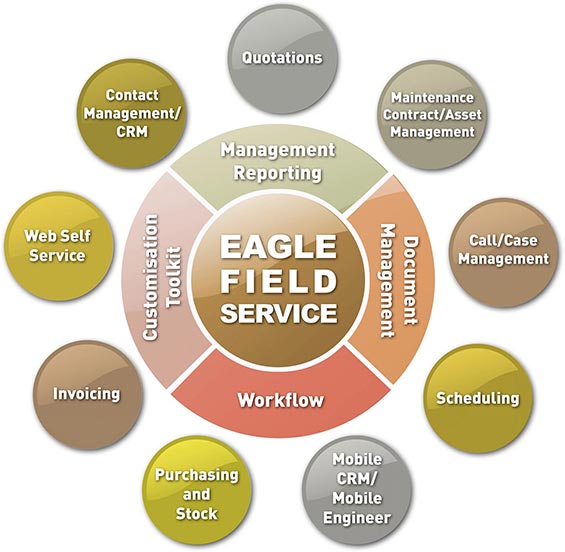With over 30 years’ experience of continually developing and delivering fully integrated business solutions and committed to utilising the latest technology, Exel offers five of the most achievable benefits obtainable through use of a modern FSM system.
1. Stock Visibility
A modern, state-of-the-art FSM system offers levels of stock visibility across a mobile workforce which would simply be impossible with either a manual system or a solution based on an older technology platform. Take just one example, managing replenishment levels and setting minimum/maximum stock levels. Not only should a modern FSM system provide complete visibility of the breakdown of stock each mobile engineer is carrying in real-time, it should also identify which are fast and slow moving items, thereby extending ‘Lean’ thinking into your mobile workforce and avoiding unnecessary costs tied up in inventory.
2. Job Scheduling
The promise of effective job scheduling lies at the heart of most FSM systems but in reality these have traditionally fallen into two categories which are often less than ideal for many companies. At one extreme is the simple ‘Call Allocation’ model which does precisely that – simply allows an operator to decide which engineer gets what job based on their own guesstimates. At the other extreme is the ‘Intelligent’ or ‘Dynamic Scheduling’ model which permanently juggles a huge amount of prescribed rules and data to continually generate an up-to-date schedule. Whereas the former places entire reliance on the operator and is mostly used in smaller companies where options may be relatively limited, the latter relies on having data relating to every possible permutation and scenario which is far too costly in terms of finance and resource for all but the very largest customers.
Recently a third type of system has become increasingly popular as it bridges the gap between the two older approaches. Called ‘Assisted Scheduling’, it allows for the system to determine a range of options based on rules based logic but also allows for this to be fine-tuned and tailored by the unique knowledge of the operator. In addition to the obvious advantages of being the best of both worlds, it also allows the system to be used equally effectively by a greater number of people. Less skilled operators can rely more on the system recommendations while higher skilled operators can bring their own insights and understanding.
3. Time to Invoice
While it may have come as no surprise a decade ago to hear of 6-8 week time periods between an engineer visit and invoicing the customer, the painful reality is that a number of companies still reliant on manual systems aren’t doing much better. Even those reliant on earlier FSM systems may well be still restricted to weekly batching. Modern, fully integrated systems however offer the ability to invoice on a same day basis, often when the engineer is still on-site.
4. Costing
Keeping costs to a minimum is vital to all companies but in the world of Field Service Management, it can be surprisingly difficult to determine exactly what those costs are. And it’s not just the exact costs of each engineer, it’s also visibility about whether a contract is financially viable, and if so, by how much. Workload does not always equate to profitability so unless you have a system which provides real-time visibility of costs as well as powerful job and business-wide reporting, you may never be able to keep on top of your costs.
5. Customer Relationship Management
The adage may well be that ‘the customer is always right’, but one thing is for certain, knowing and understanding your customers is the most effective way of doing business with them. A manual system or earlier, older FSM system simply does not have the means to retain and provide the unique information relating to each customer, which is essential to maximising that relationship. A modern system combines all the widely accepted benefits of a CRM system with the unique information relating to each FSM interaction for every customer. Most importantly, this information is then available to each and every engineer or member of your mobile workforce, enabling the most consistent, well informed interactions with every customer. And, by having access to the entire historic record of each customer, future needs and opportunities can be developed and tailored to maximise and grow that relationship.
Summary
In Exel’s experience, many companies recognise an area of need in their FSM system capabilities but they then wait until these accumulate resulting in an often hurried investment decision. However, by looking at each of the above areas as potential opportunities to gain competitive advantage, a more informed and therefore a more beneficial decision making process can be undertaken, resulting in getting the FSM solution that best suits your own individual business needs now, and into the future.

